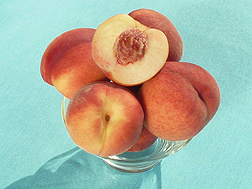| Read the magazine story to find out more. |
|
|
Introducing Gulfsnow, a New Peach Variety from ARS
By Sharon Durham
August 20, 2015
U.S. Department of Agriculture (USDA), University of Georgia and the University of Florida scientists worked cooperatively to develop Gulfsnow, a new peach variety.
The new variety should give growers in the southeastern lower coastal plain an edge in commercial production, and it offers consumers a more reliable supply of early-summertime peaches.
Gulfsnow, requires only 400 hours of chilling to flower and set fruit. By comparison, June Gold, a variety commonly grown in the targeted production area, requires 650 hours of chilling. In years when winter chilling is insufficient, June Gold can't reliably set fruit, resulting in reduced crop yields.
Agricultural Research Service (ARS) horticulturalist Thomas Beckman, at the Fruit and Nut Research Laboratory in Byron, Georgia, developed Gulfsnow to overcome the chilling problem, which has become worse in recent years as wintertime temperatures have trended warmer and chilling hours have declined.
According to Beckman, Gulfsnow will probably be used as a fresh-market fruit. It has 50 to 60 percent red skin blush over a cream ground color. The round-shaped peach has flesh that is cream-white and firm. Gulfsnow ripens in early June in Attapulgus, Georgia, about 10 days after Gulfcrimson, another ARS-developed peach, ripens. New peach varieties with different harvest times help growers produce fruit for a longer period of time each summer.
ARS has previously developed other "Gulf" series peaches—Gulfprince, Gulfking, Gulfcrest and Gulfcrimson—all considered by nurseries to be very reliable fruiting varieties.
Gulfsnow has displayed good fruit shape, appearance, eating quality, firmness and a very low incidence of split pits, making it attractive to commercial growers, according to Beckman.
A plant patent (US PP25299 P2) was awarded for the variety in February 2015. A propagation agreement is available through Florida Foundation Seed Producers, Inc., Gainesville, Florida.
Read more about this research in the August issue of AgResearch. ARS is USDA's chief intramural scientific research agency.

